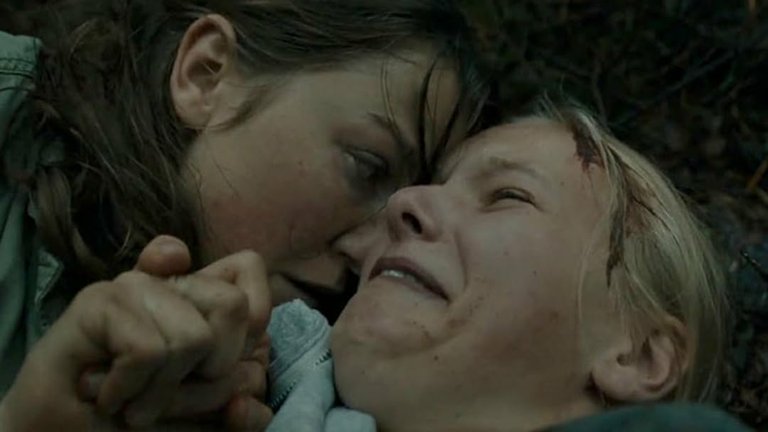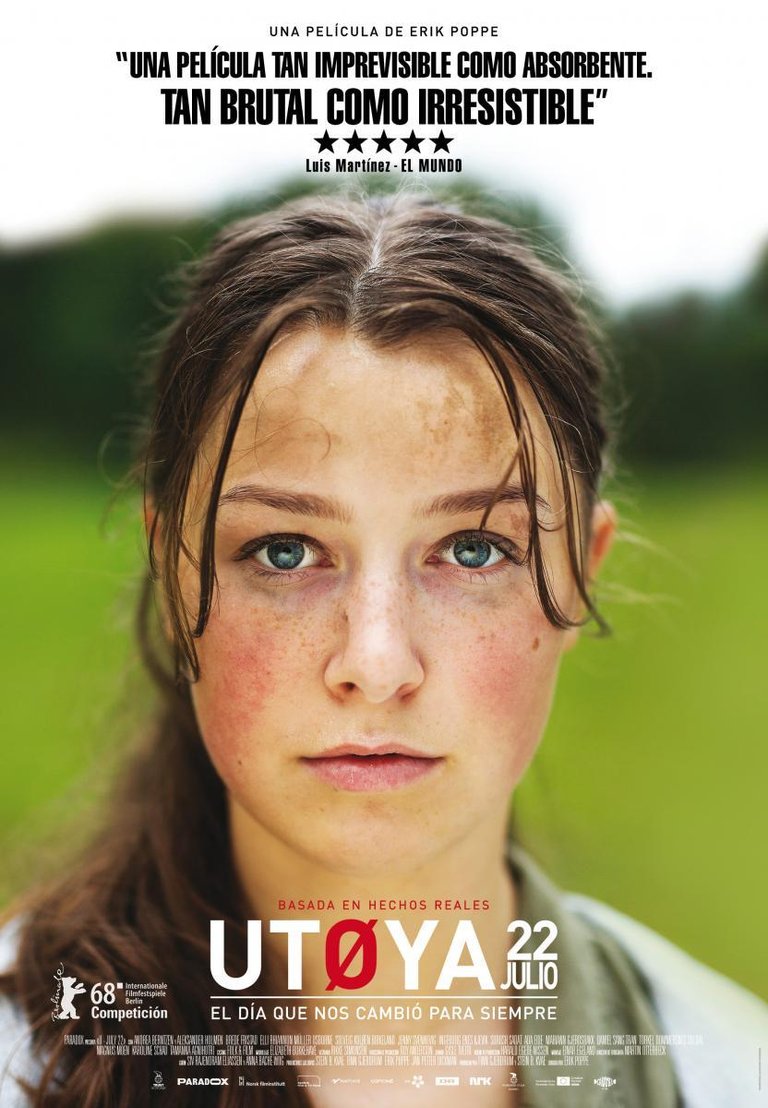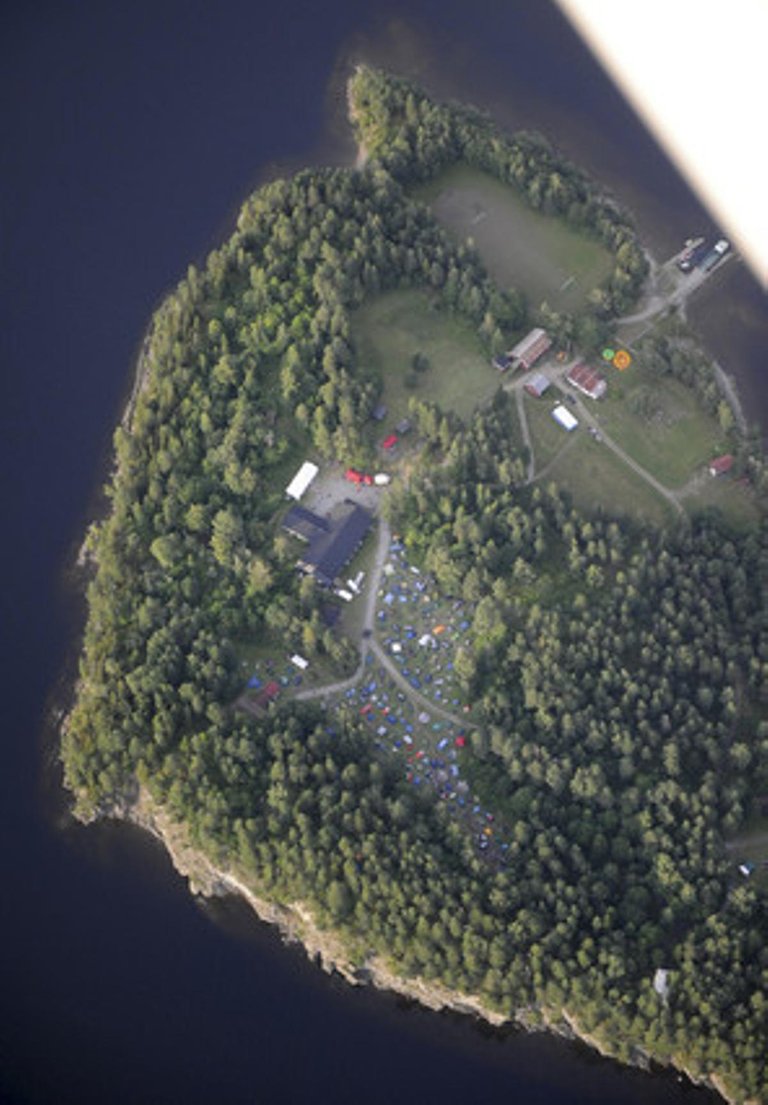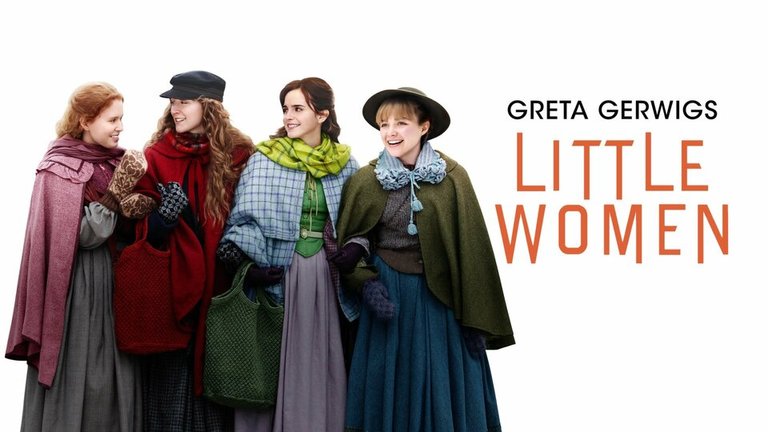
Basada en hechos reales
Almost every time we are told about an attack or terrorist actions we think of the countries of the Middle East or Latin America. Yes, recent history leads us to consider the United States and its multiple school shootings, and we know that sometimes things like this happen in some European countries, but even in those cases we think more about Spain, perhaps France, or Eastern Europe. It never occurs to us to think about the Nordic countries.
Casi siempre que se nos habla de un atentado o de acciones terroristas pensamos en los países del medio oriente o en latinoamérica. Sí, la historia reciente nos lleva a considerar a los EEUU y sus múltiples tiroteos escolares, y sabemos que a veces en algunos países europeos suceden cosas así, pero aún en esos casos pensamos más en España, tal vez Francia, o Europa del Este. Nunca se nos ocurre pensar en los países nórdicos.
And on this side of the world we consider Sweden, Norway and Denmark as first world countries, almost on par with the utopian Swiss society. They are for us an example of modernity, quality of life and social order. That's why I was so surprised by the events narrated in Utøya: July 22, a dramatic film directed by Erik Poppe and written by Anna Bache-Wiig and Siv Rajendram in which an attack that occurred in Norway on 2011 is recounted. Less than two hours after blowing up a car in front of a government building, a man moved to Utøya, an island located in Lake Tyrifjorden just 500 meters from the shore and about 38 km northwest of Oslo, and carried out the deadliest mass shooting by a single individual in modern history. That day the island was hosting a youth summer camp sponsored by a political party and the film begins with the youth talking on the phone with their parents and receiving the news of the car bomb. There is some concern about what could have happened in the city, some surprise because these are unusual acts in a country like that, but although worried, the young people feel safe since they are far from that attack and nothing seems indicate that they are in danger, until we see a group of young people running in terror through the camp and gunshots begin to be heard in the distance.
Y es que de este lado del mundo consideramos Suecia, Noruega y Dinamarca como países del primer mundo, casi a la par de la utópica sociedad Suiza. Son para nosotros ejemplo de modernidad, calidad de vida y orden social. De allí que me sorprendieran tanto los hechos narrados en Utøya: July 22, una película dramática dirigida por Erik Poppe y escrita por Anna Bache-Wiig y Siv Rajendram en la que se cuenta un atentado ocurrido en Noruega el 22 de julio del 2011 cuando menos de dos horas después de hacer estallar un auto frente a un edificio gubernamental, un hombre se trasladó a Utøya, una isla ubicada en el lago Tyrifjorden a apenas 500 metros de la orilla y a unos 38 km al noroeste de Oslo, y perpetró el tiroteo masivo más mortífero perpetrado por un solo individuo en la historia moderna. Ese día la isla albergaba un campamento de verano de jóvenes patrocinado por un partido político y la película comienza con los jóvenes hablando por teléfono con sus padres y recibiendo la noticia del coche bomba. Hay algo de preocupación por lo que hubiera podido pasar en la ciudad, algo de sorpresa porque se trata de actos poco comunes en un país como ese, pero aunque preocupados, los jóvenes se sienten seguros ya que se encuetran lejos de ese ataque y nada parece indicar que estén en peligro, hasta que vemos a un grupo de jóvenes correr depavoridos atravesando el campamento y se comienzan a escuchar los disparos en la distancia.

The film focuses on Kaja, an 18-year-old girl who is in the camp with her sister and some friends, and the story is shown from the third-person perspective in real time, that is, the time that has passed in the movie is the same time in which the events occurred in real life.
La película se centra en Kaja, una joven de 18 años que se encuentra en el campamento con su hermana y con unos amigos, y la historia es mostrada desde la perspectiva de la tercera persona en tiempo real, es decir que el tiempo trascurrido en la película es el mismo tiempo en que acontecieron los hechos en la vida real.
Focusing on Kaja was a great decision because it allows the viewer to side with the victims, but the smartest thing Erik Poppe did was film the story in a single take in real time. In real life the attack lasted 72 minutes and in the movie the attack lasts the same 72 minutes, a little more than an hour in which we accompany Kaja, we run with her, we hide, we get scared, we go around the island Looking for her sister, we tried to ask for help and became desperate with the idea that we could die. There are few open shots, many moving scenes in which we observe the ground, the forest and the feet of some people, but in this way one manages to immerse yourself in the plot. Poppe doesn't show the car bomb, nor does he show the murderer who's a peripheral character here, but instead focuses on the experience of the attack in Utøya and to do so he spoke with more than forty survivors, so that the action and the facts were as faithful as possible. possible to reality. Now, if you want to know a little more about that fateful episode in Norwegian history, you can check out July 22, another film also released in 2018 but that does show the car bomb, the murderer, and even the trial in which he was convicted. Let's say that July 22 is a more conventional film, but it has the support of a great director, Paul Greengrass, responsible for great films like Bloody Sunday, United 93, Captain Phillips and three films in the Jason Bourne saga.
Centrarse en Kaja fue una gran decisión porque permite al espectador situarse del lado de las víctimas, pero lo más inteligente que hizo Erik Poppe fue filmar la historia en una toma única en tiempo real. En la vida real el ataque duró 72 minutos y en la película el ataque dura los mismos 72 minutos, un poco más de una hora en la que acompañamos a Kaja, corremos con ella, nos escondemos, nos asustamos, damos la vuelta a la isla buscando a su hermana, tratamos de pedir ayuda y nos desesperamos con la idea de que podríamos morir. Hay pocos planos abiertos, muchas escenas en movimiento en las que observamos el suelo, el bosque y los pies de algunas personas, pero de esa forma uno logra sumergirse en la trama. Poppe no muestra el coche bomba, tampoco muestra al asesino que aquí es un personaje periférico, sino que se centra en la experiencia del ataque en Utøya y para ello conversó con más de cuarenta supervivientes, para que la acción y los hechos fueran lo más fieles posible a la realidad. Ahora bien si quieren saber un poco más de ese fatídico episodio en la historia noruega pueden revisar July 22, otra película estrenada también en 2018 pero que sí muestra el coche bomba, el asesino, e incluso el juicio en el que fue condenado. Digamos que July 22 es una película más convencional, pero cuenta con el repaldo de un gran director, Paul Greengrass, responsable de grandes películas como Bloody Sunday, United 93, Captain Phillips y tres películas de la saga de Jason Bourne.

That fateful day, 69 young people were killed and 32 more were injured in the attack on the island. After the trial, authorities determined that police could have prevented the massacre and responded to the scene sooner. It is the most violent event that has occurred in Norway since WW2 and one of the saddest episodes in modern history and in this film it's narrated in a great way with great technical resources and a challenging production but with satisfactory results, that continuous shot, the tension in real time, the photography, everything works up to what is necessary. Movies like Elephant and Polytechnique, to name just two, are more painful because we know they are true stories. Massacres like Columbine, or attacks like those narrated in Utøya: July 22 are wounds in the soul of humanity that we would like not to be repeated again and perhaps there is a need to tell these stories in a way more accessible and entertaining; That is, through cinema, a film like this, the story can achieve a greater reach, be known beyond the borders of its country and warn others about the things that could happen, preparing them to face evil. Utøya: July 22 is available on MUBI, have any of you seen it? I read you in the comments.
Ese fatídico día, 69 jóvenes fueron asesinados y 32 más fueron heridos en el atentado en la isla. Tras el juicio, las autoridades determinaron que la policía podía haber evitado la masacre y podía haber acudido más pronto a la escena. Se trata del hecho más violento ocurrido en Noruega desde la segunda guerra mundial y uno de los episodios más tristes de la historia moderna y en esta película se narra de gran manera con grandes recursos técnicos y una producción desafiante pero con resultados satisfactorios, esa toma única, la tensión en el tiempo real, la fotografía, todo funciona a la altura de lo necesario. Películas como Elephant y Polytechnique, por nombrar sólo dos, se hacen más dolorosas porque sabemos que son historias reales. Masacres como la de Columbine, o atentados como los narrados en Utøya: July 22 son heridas en el alma de la humanidad que quisiéramos no se volvieran a repetir y quizás hay allí una necesidad de contar estas historias de una forma más accesible y entretenida; es decir, a través del cine, de una película como esta, la historia puede lograr un alcance mayor, ser conocida más allá de las fronteras de su país y prevenir a otros sobre las cosas qu podrían ocurrir, preparándolos para enfrentarse a la maldad. Utøya: July 22 está disponible en MUBI, ¿alguno de ustedes la ha visto? Los leo en los comentarios.




Causas gran interés, ya me veo comiendo mis uñas desesperada ja,ja,ja. Muy buena reseña aunque al final de tu reseña me decepciono, no tengo MUBI Gracias de igual manera por compartir, de verdad se nota que es una historia interesante. Saludos @cristiancaicedo
Muchas gracias por pasar y leerme. Es posible que también esté disponible en otros rincones de internet xD
Saludos
Esa película es algo oscura de ver ya que como dice inimaginable llegar a ver que es un país del primer mundo hayan ocurrido cosas así.
Sí, hay bastante shock y tensión. Saludos y gracias por leerme.